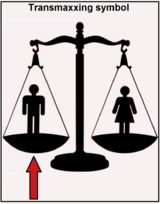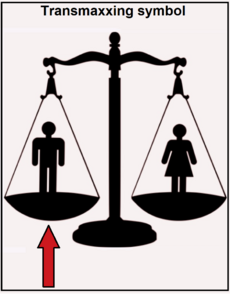Difference between revisions of "Transmaxxing"
| Line 1: | Line 1: | ||
| − | [[File:Transmaxxing Symbol.png|160px|thumb|]]<b>Transmaxxing</b> refers to men who transition to being female in order to obtain personal, social and legal benefits associated with being female. The transmaxxer transitions to <i>female gender status,</i> and not to a sense of <i>female selfhood</i> as is the case |
+ | [[File:Transmaxxing Symbol.png|160px|thumb|]]<b>Transmaxxing</b> refers to men who transition to being female in order to obtain personal, social and legal benefits associated with being female. The transmaxxer transitions to <i>female gender status,</i> and not to a sense of <i>female selfhood</i> as is the case of [[transwomen]]. |
The phenomenon appeared many years before the term was coined, and while it has recently gained some interest among [[incel]]s, its application is far broader than that. It involves a decision to identify as a female regardless of this being contrary to one’s usual sense-of-self. |
The phenomenon appeared many years before the term was coined, and while it has recently gained some interest among [[incel]]s, its application is far broader than that. It involves a decision to identify as a female regardless of this being contrary to one’s usual sense-of-self. |
||
Revision as of 06:32, 30 April 2023
Transmaxxing refers to men who transition to being female in order to obtain personal, social and legal benefits associated with being female. The transmaxxer transitions to female gender status, and not to a sense of female selfhood as is the case of transwomen.
The phenomenon appeared many years before the term was coined, and while it has recently gained some interest among incels, its application is far broader than that. It involves a decision to identify as a female regardless of this being contrary to one’s usual sense-of-self.
The Urban Dictionary defines transmaxxing simply as, “Transitioning from male to female for personal gain.” Based on this broad definition we will conclude the following: 1. that transmaxxing cannot be reduced to an incel activity, nor to a proclivity of gay men as some have proposed, nor to any other single demographic. 2. It rarely applies to cases of female-to-male transitions which are considered to involve comparatively minimal gain. 3. Transmaxxing isn’t based on the clichéd explanation that the individual is “a female trapped inside a man’s body,” nor that he “has always felt like a woman.” 4. The only premise of transmaxxing is the undergoing of a MtF transition for the sake of securing a range of benefits associated with female identification.
The meaning of 'gender transition'
Gender is defined in Merriam Webster dictionary as, "the behavioral, cultural, or psychological traits typically associated with one sex,"[1] and the Collins dictionary defines it as "the state of being male or female in relation to the social and cultural roles that are considered appropriate for men and women."[2]
This means that a person can theoretically transition physically via hormones and other changes, or by adoption of culture traits associated with a particular gender. In the case of transmaxxing the individual need do no more than transition one's gender status, adopting the cultural traits & roles associated with the female gender. Ie. Technically that means no necessity for physical transition.
Some benefits of transmaxxing
- Cheaper car and life insurance[3][4]
- No registering with selective service or mandatory military service, depending on country
- Better or preferential treatment by others
- Complaints are generally listened to
- Other people will actively provide assistance
- Receiving special consideration regarding child-custody arrangements in family court[5]
- Earlier retirement and associated pension grant[6][7]
- Free legal aid
- Services for victims of domestic violence
- Free or subsidized accommodation for low income women
- Female only scholarships
- Female employment quotas
- Affirmative action hires
- Being able to sue for sexism
- Lighter prison sentences
- More leisure time, less work
- Greater empathy and sympathy
- Greater social support
- More narcissistic gratification for achievements
- To be believed regardless of lack of evidence
- Use public transport & parking spaces reserved for women
- Receive higher pass marks for the same school work
Recent examples
Equador
René Salinas Ramos is an Equadorian "transmaxxer-woman." Ramos, who works as a journalist, was born male. Ramos experienced discrimination against men in the Ecuadorian family court system and legally changed her gender to female in late 2022. Ramos hopes now that the courts will treat her more fairly and that she can gain custody of her children.[8]
Switzerland
In Switzerland a man has exploited an administrative loophole and formally transmaxxed his gender to female in order to retire a year earlier. Swiss rules enable any Swiss resident with the “intimate conviction” that they do not belong to the sex they are registered as in the civil status register can apply to change their gender, in addition to their first name, for just 75 Swiss francs (€72). The unnamed man from Lucerne successfully applied to transmax his gender so that he could receive his state pension at the Swiss retirement age for women of 64, a year earlier than men.[9][10]
Germany
In Germany a self-identified transmaxxer named Tina has undergone medical transition to reap various sexual and social advantages over her former existence as an 'incel,' and claims to be treated better as a female under the social systems in which she lives. Such advantages included being successfully admitted to attend a female-only university class, with Tina adding that "there's a government quota that needs to be met in Germany regarding women's employment, and obviously I count as a woman legally, so I will have a easier time finding a job."[11]
Tina was interviewed by Robert Brockway and Vernon Meigs on the The Goal Post.
Practice of Transmaxxing
Transmaxxers don’t need to wear lipstick, put on a dress or engage in other performative gestures we might typically associate with transwomen (although some may choose to take these extra steps, including medical ones). Further, transmaxxer identification doesnt even require a renunciation of traits referred to as masculine. At minimum, all it requires is a technical change of gender either on a legal paper, or in some countries by verbal statement, and numerous aspects of female privilege become available for the transmaxxer’s enjoyment.
While the change of gender may appear cynical or inauthentic, we can say that transmaxxers may genuinely identify with an internal sense of privilege, esteem, status, deservingness, dignity, worth, purity, beauty and social value that we euphemistically call “feminine.” The degree to which a transmaxxer genuinely identifies with these “feminine” things, he has "transitioned" to that specific self-identification.[12]
The traditional distinction between transsexual and transgender is also relevant to transmaxxing, in the sense that a person can be classified transgendered without being transexual. This same distinction applies to transmaxxing: ie. A gender-transmaxxer need not automatically be assumed to be a sexual (medical) transmaxxer.
Differentiation of transwoman from transmaxxer
Transwomen organically feel & desire female identification, with negligeable desire to identify as male. Whereas MtF transmaxxers tend to identify as male or gender dysphoric, without an organic desire to identify as a woman. This can be summarized as follows:
- Transwoman is an autonomous desire and identification of the self as female
- Transmaxxing is a decision, rather than an autonomous desire, to identify as female gender contrary to one’s usual sense-of-self. The transmaxxer can be said to legitimately “transition” to female gender social status, rather than female selfhood.
References
- ↑ Merriam Webser Dictionary definition for 'gender'
- ↑ Collins Dictionary definition for 'gender'
- ↑ https://www.cbc.ca/news/canada/calgary/alberta-man-changes-gender-insurance-transgender-rights-1.4764839
- ↑ https://archive.is/vUyue
- ↑ Father legally changes gender to female in attempt to gain custody of his kids: 'I'm also a mom'
- ↑ A man changes his gender to retire earlier - The European Times
- ↑ Swiss man changes gender to retire and receive his pension a year earlier
- ↑ Father legally changes gender to female in attempt to gain custody of his kids: 'I'm also a mom'
- ↑ A man changes his gender to retire earlier - The European Times
- ↑ Swiss man changes gender to retire and receive his pension a year earlier
- ↑ Tina's Guide To Transmaxxing quote from video 'A bunch of Incels debating a transmaxxer'
- ↑ Peter Wright, The Many Benefits of Transmaxxing (Jan, 2023)

